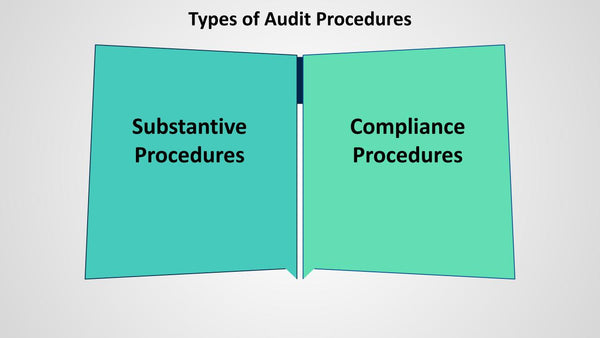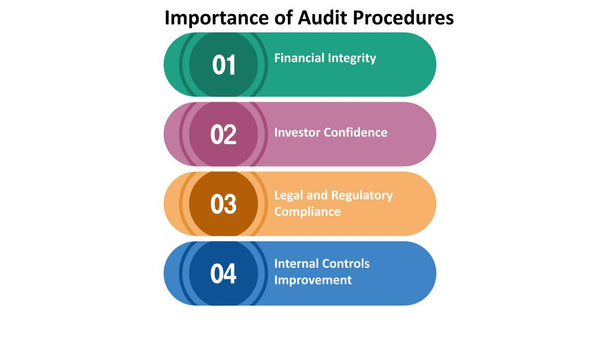Comprehensive Guide to Audit Procedures: Ensuring Financial Integrity
Auditing is a fundamental process that ensures the financial integrity and reliability of an organization's financial statements. Audit procedures encompass a comprehensive set of systematic steps and methodologies employed by auditors to meticulously examine an entity's financial records, transactions, and internal controls. In this extensive guide, we will delve deep into the intricate realm of audit procedures, exploring their diverse types, profound importance, the meticulous steps involved in conducting a successful audit, and the evolving landscape of technology in auditing.

Types of Audit Procedures
Substantive Procedures
Substantive procedures involve examining the financial data and transactions to detect material misstatements in the financial statements. This type of procedure aims to provide reasonable assurance that the financial statements are free from material errors or fraud.
- Analytical Procedures: Auditors compare financial data from different periods, ratios, or industry benchmarks to identify unusual trends or discrepancies.
- Tests of Details: Auditors conduct specific tests on individual transactions, account balances, or items to identify errors or fraud.
Compliance Procedures
Compliance procedures focus on ensuring that the organization adheres to laws, regulations, and internal policies. Auditors review the company's activities to confirm compliance.
- Testing Internal Controls: Auditors assess the effectiveness of internal controls in preventing and detecting errors or fraud.
- Substantive Testing for Compliance: Auditors conduct tests to determine if the organization is following specific regulations or contractual agreements.
Importance of Audit Procedures
- Financial Integrity
Audit procedures are critical for maintaining financial integrity. They help uncover errors or fraudulent activities, ensuring the accuracy and reliability of financial statements.
- Investor Confidence
Investors rely on audited financial statements to make informed investment decisions. Audit procedures enhance investor confidence by providing assurance that financial information is accurate.
- Legal and Regulatory Compliance
Many industries and jurisdictions require organizations to undergo audits to comply with legal and regulatory requirements. Audit procedures help ensure compliance.
- Internal Controls Improvement
Through audit procedures, organizations can identify weaknesses in their internal controls and take corrective actions to prevent errors or fraud.
Steps in Conducting Audit Procedures
Planning
- Understand the Entity: Prior to commencing the audit, auditors immerse themselves in understanding the entity, its industry, and the external factors that may impact the organization's financial standing. This foundational knowledge forms the bedrock of effective audit planning.
- Risk Assessment: Identifying and assessing risks is an inherent part of the audit planning process. Auditors meticulously evaluate the risks associated with financial statement misstatements and potential fraudulent activities.
- Audit Strategy: Developing a robust audit strategy is paramount. This involves the judicious selection of appropriate audit procedures tailored to the organization's unique circumstances and risk profile.
Execution
- Obtaining Evidence: The heart of audit execution is the collection of sufficient and appropriate audit evidence. Auditors meticulously scrutinize financial records, conduct interviews, and perform a diverse range of tests to gather the evidence necessary to support their audit conclusions.
- Testing Internal Controls: In cases where internal controls are pivotal, auditors assess their effectiveness in preventing and detecting errors or fraud. This may involve an intricate evaluation of control mechanisms and their operation.
- Analytical Procedures: The discerning use of analytical procedures comes to the fore during execution. By subjecting financial data to rigorous analysis, auditors can unearth unusual trends, anomalies, or discrepancies that merit further exploration.
Reporting
- Audit Opinion: Based on the amalgamation of audit procedures and the evidence gathered, auditors deliver an audit opinion. This opinion can be unqualified (often referred to as a clean opinion), qualified, adverse, or a disclaimer of opinion, depending on the audit findings.
- Communication: Transparent communication is pivotal. Auditors communicate their findings, recommendations, and observations to the management of the audited organization and, if required, to relevant regulatory authorities.
- Audit Report: The culmination of the audit process is the issuance of an audit report. This report encompasses the audit opinion, management's response to audit findings, and any supplementary information essential for a comprehensive understanding of the audit results.
Follow-Up
- Management Response: Following the audit, it is incumbent upon the management of the audited organization to provide a response to audit findings. This response should delineate the steps they intend to take to address identified weaknesses or issues.
- Corrective Actions: Implementing corrective actions is the logical continuation of the audit process. Organizations proactively address audit findings by making improvements to internal controls, financial processes, and overall governance

Audit Procedures in Practice
- Financial Statement Audits
Financial statement audits are the most common type of audit procedures. Auditors examine an organization's financial records, transactions, and internal controls to ensure the accuracy and reliability of the financial statements.
- Operational Audits
Operational audits focus on an organization's operations, processes, and efficiency. Auditors assess whether the organization is operating effectively and efficiently.
- Compliance Audits
Compliance audits verify whether an organization is complying with specific laws, regulations, or contractual agreements. These audits ensure that the organization follows relevant rules and guidelines.
- Forensic Audits
Forensic audits are conducted to investigate potential fraud or misconduct. Auditors use specialized techniques to uncover fraudulent activities and gather evidence for legal proceedings.
Challenges in Audit Procedures
- Data Integrity
Ensuring the accuracy and completeness of financial data can be challenging, especially in organizations with complex systems and large volumes of transactions.
- Fraud Detection
Detecting fraud requires specialized skills and techniques. Auditors must be vigilant and stay updated on emerging fraud schemes.
- Independence and Bias
Maintaining auditor independence and avoiding bias in audit procedures is essential to ensure objectivity and integrity in the audit process.
- Evolving Regulations
The regulatory landscape is constantly changing. Auditors must stay informed about new regulations and adapt their audit procedures accordingly.
Technology and Audit Procedures
- Data Analytics
The use of data analytics tools allows auditors to analyze large volumes of data more efficiently, uncovering trends and anomalies that may indicate errors or fraud.
- Blockchain Technology
Blockchain can enhance the transparency and traceability of transactions, making it easier for auditors to verify the accuracy of financial data.
- Artificial Intelligence
AI can automate data extraction and analysis, improving the speed and accuracy of audit procedures.
Conclusion
Audit procedures play a pivotal role in ensuring financial integrity, investor confidence, and regulatory compliance. Auditors follow a systematic process of planning, execution, reporting, and follow-up to conduct thorough audits. In an era of evolving technology and regulations, auditors must adapt and embrace technological advancements to enhance the effectiveness and efficiency of audit procedures. Ultimately, the trust and credibility of financial information depend on the diligence and professionalism of auditors who carry out these essential procedures.

